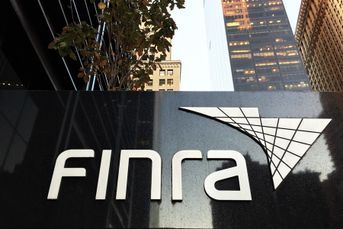HURT BY FALLING PROFITS, FIRMS PRESSURED TO COMBINE
Like businesses across the financial services industry, clearing firms are feeling the pressure and the strain from the historic market downturn. It is a difficult and competitive business environment for the firms, which are key partners to broker-dealers, clearing and settling transactions for them and their representatives.
Like businesses across the financial services industry, clearing firms are feeling the pressure and the strain from the historic market downturn. It is a difficult and competitive business environment for the firms, which are key partners to broker-dealers, clearing and settling transactions for them and their representatives.
The number of clearing firms that work with correspondent broker-dealers stands at about 16, down from about 130 in the early 1990s.
And that number could decrease further, with thin margins and the high cost of technology and compliance leading to more consolidation.
“Over the next five years, the number of clearing firms could be 10 or less,” said Doug Dannemiller, an analyst with the Aite Group LLC of Boston. “Small players are going to get squeezed out. Scale matters.”
According to a recent Aite Group study, estimated revenue for the retail-clearing industry will drop roughly 17% from 2008 to 2010.
The study, published in April, estimated revenue for the 16 firms it profiled to drop to $1.9 billion in 2010, from $2.3 billion in 2008. Aite projected annual retail-clearing revenue at $2.2 billion in 2009.
CAPITAL IS KEY
With that outlook, a clearing firm’s ability to stockpile capital is more important than ever, executives said.
“Capital has become a much more important part of the business,” said Jeff Bell, executive vice president with Wedbush Morgan Securities Inc. of Los Angeles. “The credit crisis makes it even more difficult to get funds.”
Two factors are hitting the industry, according to the study: The severe drop in the stock market since October 2007 has eroded asset-based fees, and major acquisitions linked to market upheaval have led some large retail-brokerage operations to leave clearing partners to become self-clearing.
Clearing firms are fighting an uphill battle, looking for the strategy that will carry them forward.
Pershing LLC of Jersey City, N.J., the biggest clearing firm, is focusing on services for advisers who are dually registered, meaning they are licensed both as a securities broker who charges a commission and an investment adviser who charges a fee.
Meanwhile, the No. 2 firm, National Financial Services LLC, a unit of Boston-based Fidelity Investments, is offering broker-dealers a host of clearing solutions, from the “hybrid” broker to traditional “fully disclosed” clearing relationships to a “self-clearing” platform of sorts. That platform allows broker-dealers to continue performing some clearing functions, while turning others over to National Financial.
Smaller firms are continuing to leave the industry. Last year, North American Clearing Inc. of Longwood, Fla., bit the dust.
Last month, Emmett A. Larkin Co. Inc. of San Francisco quietly shut down its clearing operations.
Larkin had a “last trade date” of June 16, according to a notice published by the National Securities Clearing Corp. of New York.
Known primarily as a bond shop, Larkin no longer will participate in a number of trading activities and services, including commission settlements, according to the statement.
Market sources, including a former broker-dealer client of Larkin, said that Larkin’s roughly 34 broker-dealer clients essentially have been handed off to Sterne Agee Clearing Inc. of Boca Raton, Fla.
Executives at Larkin and Stern Agee, including Larkin chief executive and chairman Gordon Hing, did not return calls seeking comment, and it’s unclear why the firm shuttered its clearing business.
THE BEAR-LEHMAN SCARE
The collapse last year of The Bear Stearns Cos. Inc. and Lehman Brothers Holdings Inc., both of New York, was a huge red flag to clearing firms. More than ever, clearing firms are intensely reviewing their trading partners, looking for risks.
“People have a much broader view of risk,” said Jim Crowley, managing director at Pershing. “It’s not just violent moves in the market.”
“The tipping point was Madoff and these [other] alleged Ponzi schemes,” Mr. Crowley added. “The industry has to repair that.”
The clearing industry has “always been conscious of counterparty risk,” said William Coppell, senior vice president with First Clearing LLC of St. Louis, which was acquired by San Francisco-based Wells Fargo & Co. as part of its deal last year for Wachovia Corp. of Charlotte, N.C. Now “all clearing firms are more intensely looking at it,” he said, adding that was a “natural reaction” to last year’s events.
Clearing firms are more wary than ever of potential damage to their names and reputations because of choosing errant business partners, said Robb Coombs, director of correspondent services with Raymond James & Associates Inc. of St. Petersburg, Fla.
“Where is their capital coming from? What is the ownership structure?” he asked. “Clearing firms must make sure they understand the financials of the introducing broker-dealers.”
The highly lucrative business of margin loans to clients is also being scrutinized, executives said. Interest on margin loans accounts for 27% of the clearing industry’s revenue, according to the Aite Group study.
Clearing firms historically have not given margin loans on stocks trading less than $5 per share, said Sean Malloy, senior vice president with Penson Financial Services Inc. of Dallas. “That’s under review and now changing. But people are erring on the side of caution.”
TOUGHER REGULATIONS
Regulatory pressure will only increase, executives said.
Securities and Exchange Commission officials recently have said that there will be renewed focus on examining financial services firms of all stripes, including clearing firms.
“I’m sure it will get worse before it gets better,” said Craig Gordon, president of Minneapolis-based RBC Correspondent Services.
The burden will only increase for smaller broker-dealers, and that will lead to greater responsibility for clearing and custody firms.
Against this backdrop, firms are continuing to deal with customary business changes in management and clients. This year, Norm Malo retired as president of National Financial. He was replaced by Fidelity veteran Sanjiv Mirchandani. “Fidelity is always changing,” Mr. Mirchandani said. “It’s part of its culture.”
National Financial is also experiencing the loss of a huge client, the retail-brokerage arm of New York-based JPMorgan Chase & Co., which now clears through its subsidiary, JPMorgan Clearing Corp., the broker-dealer services unit that JPMorgan took over when it acquired Bear Stearns.
E-mail Bruce Kelly at [email protected].
Learn more about reprints and licensing for this article.








